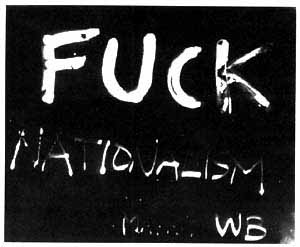Bear with me on the following. It's a bit Philosophy/Psychoanalysis 101'ish, but i'm trying to go somewhere w/ this, eventually, in terms of, well, in terms of a lot of things: representation (mimesis), female sexuality, visuality, etc. etc.... (Actually, to digress a bit further, this is all stemming from last summer's reading of Martin Jay's D
owncast Eyes and Rodolphe Gasche's
The Tain of the Mirror. I've been trying to really "get" how visuality and self-reflexivity works all year, but got distracted by "real" coursework. So this post is actually an old one that I finally have time to think through...sorta....:
****
There is a chasm between experience and reflection (cognition, self-consciousness) at the same time that they are constitutive of one another. In the moment of experience -- provided we can call it a "moment"-- the question is: am I one? Let us say that in the experience, "I" is immersed in the moment without reflecting on it during its occurence. Is this wholeness? If I am not thinking of the experience
as an experience in that very moment, then there is a lack at the heart of the presumed wholeness of immersive experience. And the something that has been left out or, perhaps, necessarily forgotten is, namely, the self-reflexive self. That part of the self that acknowledges or ruminates on or critiques (
sees) the event as it is happening is, thus, absent in the immersive or absorptive experience (think of the experience of good sex as an example of an immersive moment).
If, however, I am doubly "present" in the moment of experience-- ruminating, critiquing, reflecting etc.-- then I am split off from that immersive experience. That split is then also a lack, an absence, i.e., the lack or absence of the presumably non-split self. This doubly split self is, to my mind, reminisent of Lacan's discussion of the gaze. That is to say that the chasm between experience and reflection, which determines subjectivity needs to be re-constituted, for Lacan, in a going
beyond the paradoxical nature of the split self or the visible and invisible (Merleau-Ponty's "chiasm"). This is what, I think, in
The Four Fundamentals of Psychoanalysis, Lacan refers to as the "derealization of space." That is, the split self is constituted in and by a mimetic space wherein the gaze is located, but not via a straight, one-to-one, (Cartesian or Euclidean) form of representation. In this derealized space the split self appears via the anamorphotic image hiding in the representative figure that slips into sight obliquely, by chance or, as Zizek says, by "looking awry." What determines the split self as the desiring subject is then the scopic drive, but the scopic drive is itself constituted by that which it fails to adequately contain, i.e., the kernel of the Real, the unrepresentable, what Lacan refers to as "the gaze."
Though it's difficult to adequately pin down the definition of the gaze in Lacan, since he seems to continually redefine it, in terms of my idea of what Lacan means by the gaze, I always return to his story of the tin can that a fisherman points out to him floating on the water. The fisherman gleefully asks: Do you see that tin can? Well, it doesn't see you!" The tin can then is the gaze, and we can say that the pyschoanalyst stands in for the tin can in that, by not returning the analysand's gaze, s/he opens up the space of lack wherein fantasy projections and ultimately transference can take place. So going back to the idea that there is a "chasm" between experience and reflection, it might be rethought, along Lacanian lines, as itself the function of the gaze. In other words, the gaze-- that which doesn't recognize the subject-- constitutes the subject as aware of itself from outside itself. (In Lacan's words: "I see myself seeing myself.") Here's a bit more Lacan on the split self and the gaze:
"In the field offered us by Maurice Merleau-Ponty, more or less polarized indeed by the threads of our experience, the scopic field, the ontological status, is presented by its most factitious, not to say most outworn, effects. But it is not between the invisible and the visible we have to pass. The split that concerns us is not the distance that derives from the fact that there are forms imposed by the world towards which the intentionality of phenomenological experience directs us--hence the limits we encounter in the experience of the visible. The gaze is presented to us only in the form of a strange contingency, symbolic of what we find on the horizon, as the thrust of our experience, namely, the lack that constitutes castration anxiety. The eye and the gaze --this is for us the split in which the drive is manifested at the level of the scopic field. In our relation to things, in so far as this relation is constituted by the way of vision, and ordered in the figures of representation, something slips, passes, is transmitted, from stage to stage, and is always to some degree eluded in it--that is what we call the gaze."






